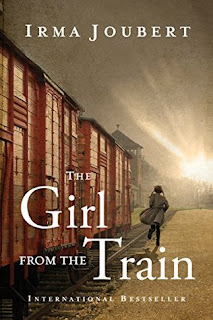The Girl From the Train by Irma Joubert
The story begins towards the end of WWII, when the Home Army (the dominant Polish resistance movement) in Poland fights against the crushing forces of Germany and Russia, with two main characters, Jakob, who takes part in destroying a German troop transport, but unscheduled train with Jews heading to Auschwitz reaches the bridge first. And six year old Gretl, who survives and Jakob finds himself taking care of her.
An endearing bond grows between those two characters. After an uprising in Warsaw, Jakob returns home to Czestochowa wounded and the roles switch, now Gretl takes care of him by feeding him and giving him his medicine.
After the war, life doesn’t get much easier. Poland is under Communist rule). People are being told what to farm. They can’t have pigs. They can’t smoke ham, because government decides when to eat ham. Under those strict rules and expending family at Jakob’s family farm house, Gretl needs to move out.
She is a bright girl of ten now. Too young to work and waste her talent. She gets selected to go to South Africa to be adopted by Protestant family. Once there the introduction of her new family is fine, but after a while the story gets a bit dry. When the story moves back to Poland, it bounces back to being engaging.
Eleven years after the war and still under Communism, Poles continue to struggle to put food on their tables. In Poznan, people start to rebel against Communism and Russian control.
Overall, the story is very interesting. For those who like to read historical fiction set during WWII, there is most likely something new you’ll read in this story. I wished more of the story was concentrated in Poland, bringing more history. Except for two short parts, when the story gets a bit dry in S Africa and at the end when it turns out to be a romance, it is still a very interesting story, worth reading.
The sentences are short and simple, and may not be to everyone’s liking. Nevertheless, it is for most of the part a page-turner.
@Facebook/BestHistoricalFiction
An endearing bond grows between those two characters. After an uprising in Warsaw, Jakob returns home to Czestochowa wounded and the roles switch, now Gretl takes care of him by feeding him and giving him his medicine.
After the war, life doesn’t get much easier. Poland is under Communist rule). People are being told what to farm. They can’t have pigs. They can’t smoke ham, because government decides when to eat ham. Under those strict rules and expending family at Jakob’s family farm house, Gretl needs to move out.
She is a bright girl of ten now. Too young to work and waste her talent. She gets selected to go to South Africa to be adopted by Protestant family. Once there the introduction of her new family is fine, but after a while the story gets a bit dry. When the story moves back to Poland, it bounces back to being engaging.
Eleven years after the war and still under Communism, Poles continue to struggle to put food on their tables. In Poznan, people start to rebel against Communism and Russian control.
Overall, the story is very interesting. For those who like to read historical fiction set during WWII, there is most likely something new you’ll read in this story. I wished more of the story was concentrated in Poland, bringing more history. Except for two short parts, when the story gets a bit dry in S Africa and at the end when it turns out to be a romance, it is still a very interesting story, worth reading.
The sentences are short and simple, and may not be to everyone’s liking. Nevertheless, it is for most of the part a page-turner.
@Facebook/BestHistoricalFiction

Comments
Post a Comment